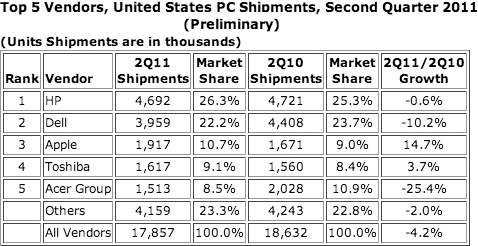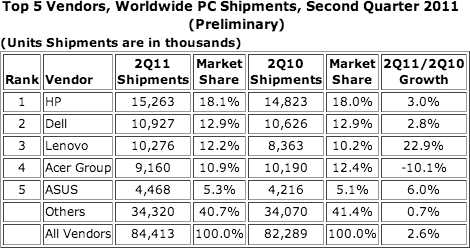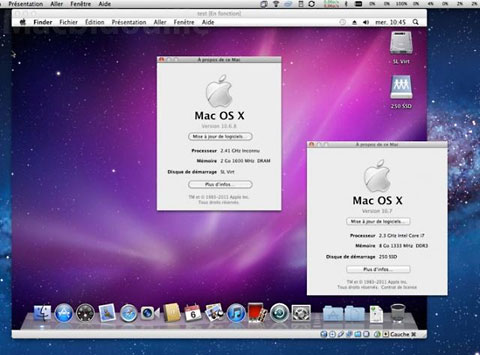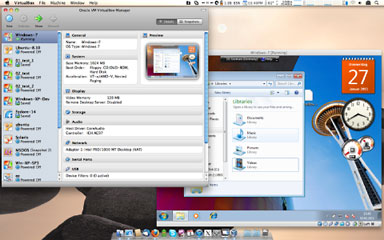Mac notebook and other portable computing is covered in The 'Book Review. iPad, iPod, iPhone, and
Apple TV news is covered in iOS News
Review. All prices are in US dollars unless otherwise noted.
News & Opinion
Troubleshooting
Software
News & Opinion
Apple #3 in US Market
 PR: Worldwide PC shipments increased 2.6%
in the second quarter of 2011 (2Q11), according to the International
Data Corporation (IDC) Worldwide Quarterly PC Tracker. The results are
just short of IDC's May projections for 2.9% growth and represent a
combination of a hangover from the more than 20% growth in the first
half of 2010 as well as competition from smartphones, other consumer
products, and pressure from lackluster economic conditions. As in 1Q11,
the United States and Western Europe were among the weaker regions,
reflecting constrained demand in more mature markets, while emerging
regions - particularly Latin America and Asia/Pacific (excluding Japan)
- fared better.
PR: Worldwide PC shipments increased 2.6%
in the second quarter of 2011 (2Q11), according to the International
Data Corporation (IDC) Worldwide Quarterly PC Tracker. The results are
just short of IDC's May projections for 2.9% growth and represent a
combination of a hangover from the more than 20% growth in the first
half of 2010 as well as competition from smartphones, other consumer
products, and pressure from lackluster economic conditions. As in 1Q11,
the United States and Western Europe were among the weaker regions,
reflecting constrained demand in more mature markets, while emerging
regions - particularly Latin America and Asia/Pacific (excluding Japan)
- fared better.
"These preliminary results continue to reflect pressure from
competing consumer and business products as well as cautious spending,"
said Jay Chou, senior research analyst with IDC's Worldwide Quarterly
PC Tracker. "Nevertheless, product refreshes and promotions in the
second half of the year as well as easier year-ago data should boost
growth in the second half of the year."
 "The US PC market continued to contract in
2Q11, largely as a result of three factors. The first is an ongoing
contraction in the mini notebook (netbook) market and related
inventories. The second is the impact of 2Q10's difficult-to-sustain
12% growth. And third, demand has softened as corporate buyers continue
to focus on increasing share of their IT budget in new IT solutions
such as cloud and virtualization, and consumer interest shifts to media
tablets," says Rajani Singh, research analyst, United States Quarterly
PC Tracker. "Given the weakness of 2H10, we expect a better market
environment in 2H11 with mid-single digit growth rates in the third
quarter's back to school and fourth quarter's holiday season."
"The US PC market continued to contract in
2Q11, largely as a result of three factors. The first is an ongoing
contraction in the mini notebook (netbook) market and related
inventories. The second is the impact of 2Q10's difficult-to-sustain
12% growth. And third, demand has softened as corporate buyers continue
to focus on increasing share of their IT budget in new IT solutions
such as cloud and virtualization, and consumer interest shifts to media
tablets," says Rajani Singh, research analyst, United States Quarterly
PC Tracker. "Given the weakness of 2H10, we expect a better market
environment in 2H11 with mid-single digit growth rates in the third
quarter's back to school and fourth quarter's holiday season."
Regional Outlook
- United States - With a decline of 4.2% year over year, the market
was still downcast from a combination of exuberant consumption a year
ago and a tenuous economic recovery, but the quarter also marked
substantial growth from 1Q11, and total shipments topped over 17.8
million.
- Europe, Middle East, Africa (EMEA) - The EMEA PC market continued
to contract in 2Q11, in line with IDC's forecast, as sustained high
levels of inventory prevented stronger sell-in, particularly in Western
Europe, where budget cannibalization from media tablets and smartphones
continued to contribute to weak consumer demand and slow stock
depletion. However, Central and Eastern Europe (CEE) and the Middle
East and Africa (MEA) continued to expand and enjoyed positive growth
overall.
- Japan - The impact of the earthquake on PC buying proved to be
limited, thus the market produced stronger results than expected, with
3% growth. Many commercial projects commenced as earlier fears of
inventory shortage did not materialize. Coupled with continued average
selling price (ASP) declines since the beginning of 2011, consumer
shipments also fared better than expected.
- Asia/Pacific (excluding Japan) - returned to double-digit growth of
just over 12% as the market came in slightly above forecasts. A weak
consumer market weighed down India, but other key markets like China
continued their momentum to help offset this, despite the ongoing
inflation challenges there.
Vendor Outlook
- HP grew 3% compared to the second quarter of 2010. The vendor saw
good growth in key emerging markets and also EMEA, but also had a
slight drop in volume compared to the previous quarter.
- Dell saw growth of 2.8% worldwide. It managed to slow the pace of
declines in key markets compared to the first quarter, with good gains
in key emerging markets.
- Lenovo outpaced Acer Group to become the number 3 vendor worldwide.
It continued to reap the results of its channel expansion in markets
outside of Asia/Pacific, garnering notable gains in the US and Japan.
All regions saw positive growth and total volume increased by nearly
23% on the year.
- Acer shipments continued to decline from a year ago, but at a
slower pace than in the first quarter as the company was affected by a
review of inventory handling, as well uncertainties from its recent
management shake-up.
- ASUS grew 6% to overtake Toshiba for the number 5 spot. While the
vendor has had some difficulties adjusting for the decline in Mini
Notebook PCs, it mainstream notebooks did well, especially in emerging
markets.
Table Notes:
- Some IDC estimates prior to financial earnings reports.
- Shipments include shipments to distribution channels or end users.
OEM sales are counted under the vendor/brand under which they are
sold.
- PCs include desktops, portables, and mini notebooks, and do not
include handhelds, x86 servers, and media tablets (i.e. iPad and
Android-based Tablets). Data for all vendors are reported for calendar
periods.
IDC's Worldwide Quarterly PC Tracker gathers PC market data in over
80 countries by vendor, form factor, brand, processor brand and speed,
sales channel, and user segment. The research includes historical and
forecast trend analysis as well as price band and installed base
data.
Link: PC Market
Returns to Positive Growth in Line with Expectations, Though Gains
Remain Small, According to IDC
Apple Accounts for 20% of US Retail Sales
Growth
USA Today's Scott Patterson says that new research shows Apple
taking a massive bite out of retail sales in the US, with booming
demand for the company's iPhone, iPad, and Macintosh personal computers
making Apple the fastest-growing major retailer in terms of sales
growth in the US, and noting that in the first three months of 2011,
Apple's US sales rose by $4.6 billion, an 80% increase from a year ago,
accounting for a whopping one-fifth of all sales growth by publicly
traded retailers in the US, according to a recent analysis of sales
trends by retail sales expert David Berman.
Link: Apple Taking
Massive Bite of US Retail Sales
Create a Bootable OS X 10.7 Lion DVD or Flash
Drive
SubRosaSoft.com Inc. notes that Apple has announced that with the
release of OS X 10.7 Lion, due
this month, the operating system will be available only via download
from the Mac App Store. Past versions of Mac OS X have always been
available for purchase on a bootable DVD, and with some systems like
the MacBook Air, they've been included on a bootable USB drive.
SubRosaSoft has helpfully posted an illustrated tutorial on how to
create your own bootable USB device using your own flash drive (note
that the device must be 4 GB or larger) or DVD.
Link: Create a Bootable
Mac OS X 10.7 Lion Flash Drive
Install OS X Lion Using Target Disk Mode
OS X Daily says another method to install OS X Lion on other
personal machines is by using Target Disk Mode, which allows you to use
one Mac as the installation drive to install OS X 10.7 directly to
another Mac via FireWire or Thunderbolt. It's fast, and it eliminates
the need for redownloading the upgrade for each machine, saving
bandwidth, and it works flawlessly, although an alternate method some
consider even easier and slicker is to create and use a Lion install
USB drive or even a homemade Lion installation DVD.
This tutorial shows you how to install OS X Lion on another Mac
using Target Disk Mode only.
Link: How to Install Mac
OS X Lion Using Target Disk Mode
Run Snow Leopard as a Virtual Machine on a Lion
Mac
Hardmac's Lionel says:
"The disappearance of Rosetta was for us one of the biggest flaws of
Mac OS Lion. We had said previously that we would look into the
possible virtualization of Snow
Leopard on Lion, and we have now done so.

Snow Leopard can run virtualized on a Mac running Lion.
"We decided to go with the most simple solution, by using VirtualBox
4.0 (more below), which has several advantages, the
first one being that it is free, and it supports OS X (theoretically OS
X Server as well), but . . . despite [a] few limitations, it
is possible to have a virtual Snow Leopard computer on a Lion
computer."
Publisher's note: This could solve the problems caused by the lack
of Rosetta in OS X 10.7 Lion, but you'll want a Mac with lots of system
memory to make this work efficiently, probably 4 GB or more.
dk
Link: A Snow Leopard VM
on Mac OS Lion
Quicken Won't Run on Lion, but 10 Other Finance
Apps Will
TUAW's Steven Sande notes that OS X Lion could be hitting the Mac
App Store this week, and for many Mac users, the decision on whether or
not to upgrade to Lion is boiling down to one incompatible app -
Quicken for Mac, which will not run under OS X 10.7 Lion.
Sande discusses what your options are to control your personal
finances with a Lion-compatible Mac app and suggests that you'll be
glad to know Intuit's flagship app isn't the only game in town.
Options he examines include:
- Quicken Essentials for Mac
- Mint.com
- Quicken Deluxe on Windows
- iBank 4
- Money 4
- iFinance for Mac
- MoneyWell
- Koku
- PocketMoney
- Budget
- iCompta
- Squirrel
- iCash SE
Publisher's note: Our own Alan Zisman posted a tutorial today detailing the
steps necessary to migrate from Quicken 2005 or 2007 on the Mac to
either Quicken Essential for Mac or Quicken Deluxe on Windows. The most
important thing is that all of this must be done before Lion is
installed, as it depends on PowerPC software. dk
Link: Quicken Won't Run
on Lion: 10 Mac Finance Apps That Will
Lion Fatally Mauls Quicken for Mac: 9
Alternatives
ZDNet's Jason D. O'Grady notes that Apple has killed Rosetta in
Lion, and aftershocks are starting to ripple through the Mac community
as the imminent release of Apple's next-generation operating system
bears down.
Rosetta was built to run PowerPC code on Intel Macs as a way to
bridge a gap until software developers could make their code
Intel-native. O'Grady notes that while most Mac developers, at least
ones interested in carrying on with Mac support, have long-since ported
their applications to Intel, some huge software monoliths - Quicken's
developer Intuit being an example - chose to bank extra profits instead
of investing in their updated code.
Consequently, Quicken 2005, 2006, and 2007 for Mac will not work
with Lion when it ships, and Intuit is suggesting a switch to
bare-bones Quicken Essentials, a subset of the full Quicken program, as
a workaround, but it's likely that won't appeal for serious Quicken
users.
Others have suggested that it may be time to switch to a different
personal finance application for the Mac from developers with a serious
commitment to the platform, with potential candidates being:
- Mint.com, Web-only)
- Moneydance
- Checkbook or Checkbook Pro
- iBank
- iCash
- SEE Finance
- YNAB (You Need A Budget)
- Liquid Ledger
- Fortora Fresh Finance
However, O'Grady reports that these may not be completely
satisfactory solutions either.
Link: Lion Fatally Mauls
Quicken for Mac
10 Years of Mac OS X: Paul Thurrott Takes a Look
Back
WinSuperSite's Paul Thurrott says:
"Readers have long misunderstood my relationship with Apple and its
fans, but one thing is clear: From the moment I began covering Apple
from a news perspective in the mid-1990s, I started getting complaints
from the Windows user base about a topic they felt - as now - was
perhaps a bit too far outside the acceptable. I disagreed then, as I do
now. Apple is, and has always been, important, both to the PC industry
at large and, in a less direct manner, to Windows users. And that's
because Apple's influence can be seen everywhere, and because Apple's
operating systems compete directly with Microsoft's, causing a
situation in which both firms copy each other and accuse the other of
the same.
"What's changed over the years, of course, is that Apple has only
grown in prominence, influence, and market power. And while the vast
majority of that change has come from devices like the iPod, iPhone,
and now iPad, Apple's mainstream computer OS, Mac OS X, has always
represented a viable alternative to Windows. And as this system has
evolved and matured over the past decade, it's gotten better and
better."
Leading up to his full review of Mac OS X Lion coming this week,
Thurrott takes a look back at his Mac OS X reviews and related
articles, dating from the original Mac OS X release in 2001.
Link: Apple
Mac OS X: A Look Back
Mini DisplayPort to HDMI Cables Face Recall
AppleInsider's Blake Steven reports:
"HDMI Org, the group that oversees HDMI specifications, has deemed
Mini DisplayPort to HDMI cables outside of its standard and will not
allow them to be sold."
Publisher's note: We first covered this in last week's 'Book Review. dk
Link: Mini DisplayPort
to HDMI Cables Face Recall Over Licensing Issues
Troubleshooting
Troubleshooting RAM in OS X
MacFixIt's Topher Kessler observes that tackling RAM problems in
computers is not the easiest of tasks and identifying problems with it
can sometimes be daunting, noting that if part of a RAM chip is bad, it
may still work fine until a specific application runs into the bad
areas, and then that process will not be able to store items properly
and will either hang or crash, but it's not easy to distinguish a RAM
problem from other potential sources for a crash.
Link: Troubleshooting RAM in OS
X
Software
VirtualBox 4.0.10 X86 Virtualizer
Released, Ready for Lion
PR: VirtualBox is a general-purpose full virtualizer for x86
hardware, targeted at server, desktop and embedded use, with an open
architecture using extension packs and the base package is under
GPLv2.
 Oracle has
released VirtualBox 4.0.10, a maintenance release of VirtualBox 4.0. It
improves stability and fixes regressions.
Oracle has
released VirtualBox 4.0.10, a maintenance release of VirtualBox 4.0. It
improves stability and fixes regressions.
VirtualBox is a powerful x86 and AMD64/Intel64 virtualization
product for enterprise as well as home use. Not only is VirtualBox an
extremely feature rich, high performance product for enterprise
customers, it is also the only professional solution that is freely
available as Open Source Software under the terms of the GNU General
Public License (GPL) version 2.
Presently, VirtualBox runs on Windows, Linux, Macintosh, and Solaris
hosts and supports a large number of guest operating systems including,
but not limited to, Windows (NT 4.0, 2000, XP, Server 2003, Vista,
Windows 7), DOS/Windows 3.x, Linux (2.4 and 2.6), Solaris and
OpenSolaris, OS/2, and OpenBSD.
VirtualBox is being actively developed with frequent releases and
has an ever growing list of features, supported guest operating
systems, and platforms it runs on. VirtualBox is a community effort
backed by a dedicated company: Everyone is encouraged to contribute
while Oracle ensures the product always meets professional quality
criteria.
Link: VirtualBox
Desktop Mac
Deals
Low End Mac updates the following price trackers monthly:
For deals on current and discontinued 'Books, see our 13" MacBook and MacBook Pro,
MacBook Air, 13" MacBook Pro, 15" MacBook Pro, 17" MacBook Pro, 12" PowerBook G4, 15" PowerBook G4, 17" PowerBook G4, titanium PowerBook G4,
iBook G4, PowerBook G3, and iBook G3 deals.
We also track iPad,
iPhone, iPod touch, iPod classic, iPod nano, and iPod shuffle deals.

 PR: Worldwide PC shipments increased 2.6%
in the second quarter of 2011 (2Q11), according to the International
Data Corporation (IDC) Worldwide Quarterly PC Tracker. The results are
just short of IDC's May projections for 2.9% growth and represent a
combination of a hangover from the more than 20% growth in the first
half of 2010 as well as competition from smartphones, other consumer
products, and pressure from lackluster economic conditions. As in 1Q11,
the United States and Western Europe were among the weaker regions,
reflecting constrained demand in more mature markets, while emerging
regions - particularly Latin America and Asia/Pacific (excluding Japan)
- fared better.
PR: Worldwide PC shipments increased 2.6%
in the second quarter of 2011 (2Q11), according to the International
Data Corporation (IDC) Worldwide Quarterly PC Tracker. The results are
just short of IDC's May projections for 2.9% growth and represent a
combination of a hangover from the more than 20% growth in the first
half of 2010 as well as competition from smartphones, other consumer
products, and pressure from lackluster economic conditions. As in 1Q11,
the United States and Western Europe were among the weaker regions,
reflecting constrained demand in more mature markets, while emerging
regions - particularly Latin America and Asia/Pacific (excluding Japan)
- fared better. "The US PC market continued to contract in
2Q11, largely as a result of three factors. The first is an ongoing
contraction in the mini notebook (netbook) market and related
inventories. The second is the impact of 2Q10's difficult-to-sustain
12% growth. And third, demand has softened as corporate buyers continue
to focus on increasing share of their IT budget in new IT solutions
such as cloud and virtualization, and consumer interest shifts to media
tablets," says Rajani Singh, research analyst, United States Quarterly
PC Tracker. "Given the weakness of 2H10, we expect a better market
environment in 2H11 with mid-single digit growth rates in the third
quarter's back to school and fourth quarter's holiday season."
"The US PC market continued to contract in
2Q11, largely as a result of three factors. The first is an ongoing
contraction in the mini notebook (netbook) market and related
inventories. The second is the impact of 2Q10's difficult-to-sustain
12% growth. And third, demand has softened as corporate buyers continue
to focus on increasing share of their IT budget in new IT solutions
such as cloud and virtualization, and consumer interest shifts to media
tablets," says Rajani Singh, research analyst, United States Quarterly
PC Tracker. "Given the weakness of 2H10, we expect a better market
environment in 2H11 with mid-single digit growth rates in the third
quarter's back to school and fourth quarter's holiday season."
 Oracle has
released VirtualBox 4.0.10, a maintenance release of VirtualBox 4.0. It
improves stability and fixes regressions.
Oracle has
released VirtualBox 4.0.10, a maintenance release of VirtualBox 4.0. It
improves stability and fixes regressions.
